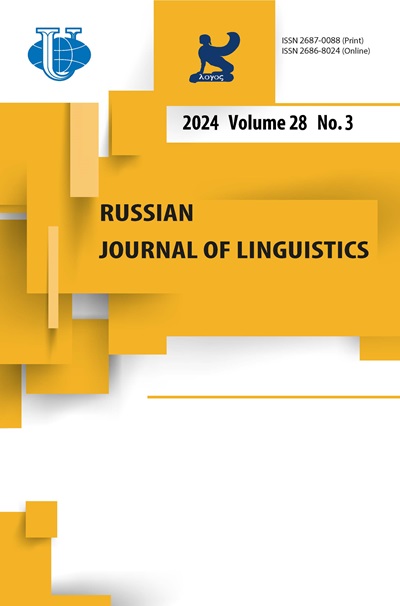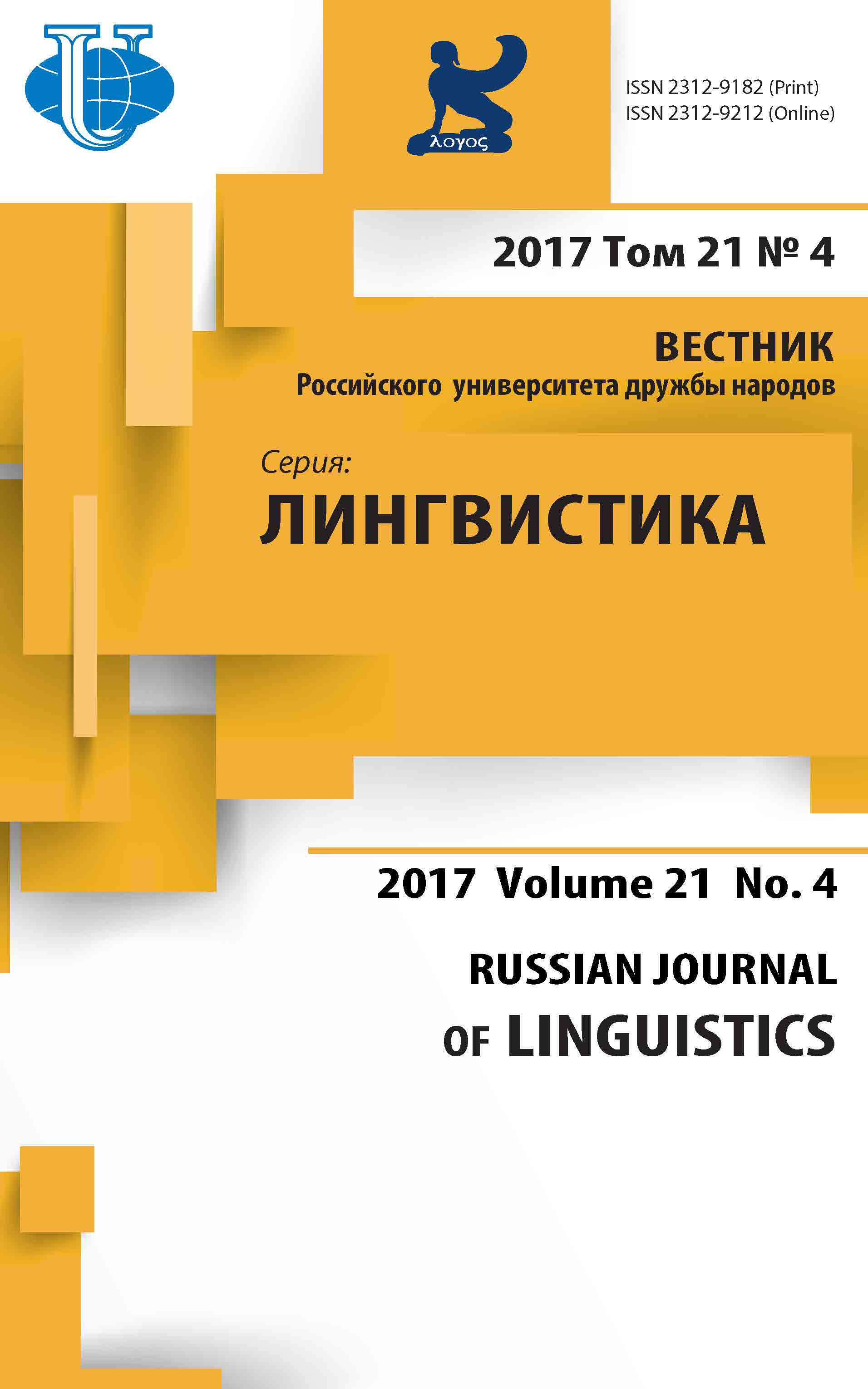THE SYSTEM PANORAMA OF COGNITIVE REPRESENTATION FOR TAXIS SEMANTICS
- Authors: Alefirenko NF1, Nurtazina MB2
-
Affiliations:
- Belgorod State National Research University
- L.N. Gumilyov Eurasian National University
- Issue: Vol 21, No 4 (2017)
- Pages: 706-728
- Section: Articles
- URL: https://journals.rudn.ru/linguistics/article/view/17305
- DOI: https://doi.org/10.22363/2312-9182-2017-21-4-706-728
Cite item
Full Text
Abstract
About the authors
N F Alefirenko
Belgorod State National Research University
Email: alefirenko@bsu.edu.ru
Nikolay Alefirenko - Honorary Worker of Science of the Russian Federation, Doctor of Philology, Professor at the Department of Philology of the Belgorod National Research University, Belgorod, Russia, member of the phraseological commission of the International Committee of Slavists; full member of the Russian Academy of Social Sciences (Russian Academy of Social Sciences). Research Interests: general linguistics, cognitive semantics, linguoculturology and phraseology 85 Pobedy str. 308015, Belgorod, Russia
M B Nurtazina
L.N. Gumilyov Eurasian National University
Email: nurtazina2@gmail.com
Maral Nurtazina - Honorary Education Worker of the Republic of Kazakhstan, Doctor of Philology, Professor at the Department of Theoretical and Applied Linguistics of the L.N. Gumilyov Eurasian National University, Astana, Kazakhstan. Research Interests: Intercultural Communication, Bilingual education, Pragmatics, Semantics, Discourse Analysis. 2 K. Satpayev str. 010008, Astana, Kazakhstan
References
- Алефиренко Н.Ф. Лингвокультурология: ценностно-смысловое пространство языка: учебное пособие. Москва: Флинта: Наука. 2010. [Alefirenko, N.F. (2010). Lingvokulturologiya: cennostno-smyslovoe prostranstvo yazyka: uchebnoe posobie. Moscow: Flinta: Nauka. (In Russ).]
- Алефиренко Н.Ф., Корина Н.Б. Проблемы когнитивной лингвистики: Научная монография. Нитра: УКФ. 2011 [Alefirenko, N.F., Korina, N.B. (2011) Problemy kognitivnoy lingvistiki: Nauchnaya monografiya. Moscow: Nitra: UKF. (In Russ).]
- Болдырев Н.Н. Концептуальная основа языка // Когнитивные исследования языка. Вып. IV. Концептуализация мира в языке: коллектив. монография. М.-Тамбов: Ин-т языкознания РАН / Издательский дом ТГУ им. Г.Р. Державина. 2009. [Boldyrev, N.N. (2009) Konceptualnaya osnova yazyka // Kognitivnye issledovaniya yazyka. Vyp. IV. Konceptualizaciya mira v yazyke: kollektiv. monografiya. Moscow-Tambov. (In Russ).]
- Бондарко А.В. Теория значения в системе функциональной грамматики: На мат. рус. языка. М.: Языки славянской культуры. 2002. [Bondarko, A.V. (2002) Teoriya znacheniya v sisteme funkcionalnoy grammatiki: Na mat. rus. yazyka. Moscow: Yazyki slavyanskoy kultury. (In Russ).]
- Гусман Тирадо, Рафаэль. К проблеме категории таксиса в русском и испанском языках, en: Język rosyjski w konforntacji z językami Europy w aspekcie lingwokulturoznawczym, Katowice (Polonia), Universidad de Silesia, 2004, Vol. III, págs. 239-255. [Gusman Tirado, Rafael (2004) K probleme kategorii taksisa v russkom i ispanskom yazyikah, v Język rosyjski w konforntacji z językami Europy w aspekcie lingwokulturoznawczym, Katowice (Polonia), Universidad de Silesia, Vol. III. (In Russ).]
- Демьянков В.З. Когнитивная лингвистика как разновидность интерпретирующего подхода // Вопросы языкознания. 1994. № 4. С. 17-33. [Demyankov, V.Z. (1994) Kognitivnaya lingvistika kak raznovidnost interpretiruyuschego podhoda // Voprosy yazykoznaniya. № 4. (In Russ).]
- Зализняк А.А., Шмелев А.Д. Введение в русскую аспектологию. М.: Языки русской культуры, 2000. 226 с. [Zaliznyak, A.A., Shmelev, A.D. (2000) Vvedenie v russkuyu aspektologiyu. Moscow: Yazyki russkoi kul'tury. (In Russ).]
- Золотова Г.А. Категория времени и вида с точки зрения текста // Вопросы языкознания. 2002. № 3. С. 7-29. [Zolotova, G.A. (2002) Kategoriya vremeni i vida s tochki zreniya teksta. Voprosy yazykoznaniya. № 3. (In Russ).]
- Золотова Г.А., Онипенко Н.К., Сидорова М.Ю. Коммуникативная грамматика русского языка. М.: Наука, 1998. 528 с. [Zolotova, G.A., Onipenko, N.K., Sidorova, M.Yu. (1998) Kommunikativnaya grammatika russkogo yazyka. Moscow: Nauka. (In Russ).]
- Красных В.В. Виртуальная реальность или реальная виртуальность? (Человек. Сознание. Коммуникация): Монография. М.: МГУ. 1998. [Krasnyh, V.V. (1998) Virtualnaya realnost ili realnaya virtualnost? (Chelovek. Soznanie. Kommunikaciya): Monografiya. Moscow: MGU. (In Russ).]
- Кубрякова Е.С. О когнитивной лингвистике и семантике термина «когнитивный» // Вестник ВГУ. Серия Лингвистика и Межкультурная коммуникация. Вып.1. 2001. [Kubryakova, E.S. (2001) O kognitivnoy lingvistike i semantike termina “kognitivnyy”. Vestnik VGU. Seriya Lingvistika i Mezhkulturnaya kommunikaciya. Vyp. 1. (In Russ).]
- Лакофф Дж., Джонсон М. Метафоры, которыми мы живем. Изд. 2-е. М.: Изд-во ЛКИ. 2008. [Lakoff, Dzh., Dzhonson, M. (2008) Metafory, kotorymi my zhivem. Izd. 2-e. Moscow: Izd-vo LKI. (In Russ).]
- Минский М. Фреймы для представления знаний. М.: Прогресс, 1979. [Minskiy, M. (1979) Freymy dlya predstavleniya znaniy. Moscow: Progress. (In Russ).]
- Нуртазина М.Б. Недифференцированная разновидность аспектуально-таксисной ситуации // Функционирование языковых единиц и категорий в синхронии и диахронии: Сб. науч. ст. Таллинн: ТГПИ им. Э.Вильде. 1989. [Nurtazina, M.B. (1989) Nedifferencirovannaya raznovidnost aspektualno-taksisnoy situacii. Funkcionirovanie yazykovyh edinic i kategoriy v sinhronii i diahronii: Sb. nauch. st. Tallinn. (In Russ).]
- Нуртазина М.Б. Синергетическая модель функциональной грамматики: Научное издание. Санкт-Петербург-Астана: ЕНУ им. Л.Н. Гумилева. 2016. [Nurtazina, M.B. (2016) Sinergeticheskaya model funkcionalnoy grammatiki: Nauchnoe izdanie. Sankt-Peterburg-Astana: ENU im. L.N. Gumileva. (In Russ).]
- Петрухина Е.В. Когнитивные аспекты изучения русского глагола и категории вида // Горизонты современной лингвистики: Традиции и новаторство. М.: Языки славянских культур. 2009. [Petruhina, E.V. (2009) Kognitivnye aspekty izucheniya russkogo glagola i kategorii vida. Gorizonty sovremennoy lingvistiki: Tradicii i novatorstvo. Moscow: Yazyki slavyanskih kultur. (In Russ).]
- Потебня А.А. Из записок по русской грамматике. М.: Просвещение, 1977. Вып. 2. Т. IV: Глагол. [Potebnya, A.A. (1977) Iz zapisok po russkoy grammatike. Moscow: Prosveschenie, Vyp. 2. T. IV: Glagol. (In Russ).]
- Филлмор Ч. Фреймы и семантика понимания // Новое в зарубежной лингвистике. Вып. XXIII: Когнитивные аспекты языка. М.: Прогресс. 1988. [Fillmor, Ch. (1988) Freymy i semantika ponimaniya. Novoe v zarubezhnoy lingvistike. Vyp. XXIII: Kognitivnye aspekty yazyka. Moscow: Progress. (In Russ).]
- Храковский В.С. Категория таксиса (общая характеристика) // Вопросы языкознания. 2003, № 2. С. 32-54. [Khrakovskii, V.S. (2003) Kategoriya taksisa (obshchaya kharakteristika). Voprosy yazykoznaniya. № 2. (In Russ).]
- Якобсон Р.О. Шифтеры, глагольные категории и русский глагол // Принципы типологического анализа языков различного строя. М.: Наука. 1963. [Yakobson, R.O. (1963) Shiftery, glagolnye kategorii i russkiy glagol. Principy tipologicheskogo analiza yazykov razlichnogo stroya. Moscow: Nauka. (In Russ).]
- Bloomfield L. (1946) Algonquian. Linguistic Structures of Native America (Viking Fund Publication in Anthropology). New York, 1946. № 6. P. 94-102.
- Bruner, J. (1990) Acts of meaning. Cambridge, MA: Harvard University Press.
- Dörnyei, Zoltán (2007) Research methods in applied linguistics. Oxford: Oxford University Press.
- Gumperz, J. (1982) Discourse Strategies. Cambridge, MA: Cambridge University.
- Schiffrin, D. (1995) Approaches to discourse. Cambridge, MA: Blackwell Publishers.
- Steffensen, S.V., Michiko, U., & Kramsch, C. (2014) The ecology of intercultural interaction: Timescales, temporal ranges and identity dynamics. Language Sciences, 41A, 41-59. doi: 10.1016/j.langsci.2013.08.006.
- Swoyer, C. (2011) How does language affect thought? In V. Cook & B. Bassetti (eds.). Language and Bilingual Cognition. New York, NY: Psychology Press.
- Vygotsky, L. S. (1978) Mind in Society: Development of Higher Psychological Processes. Cambridge, MA: Harvard University Press.
- Wertsch, J. (1990) The voice of rationality in a sociocultural approach to mind. In L.C. Moll (Ed.), Vygotsky and education: Instructional implications and applications of sociohistorical psychology (pp. 111-126). Cambridge, MA: Cambridge University.
- Whor f, B.L. (1940/1956) In J.B. Carroll (Ed.), Language, thought and reality: Selected writings of Benjamin Lee Whorf. Cambridge, MA: MIT Press.

















